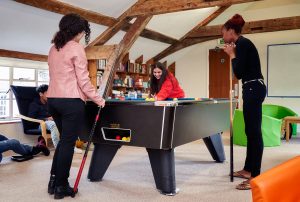Source: (10) Play and Creativity in Boarding | LinkedIn
It is well-known that over the last two decades leaders in the corporate world have turned to the world of play to improve employee wellbeing, increase team bonding, and enhance their employees’ communication skills. All of this, they have found, has the very positive side-effect of increasing work productivity and creativity in the workplace. It is similarly well-known that play is beneficial for young children’s learning and development. For example, academic studies indicate that introducing play into the primary classroom is associated with children’s concurrent and later mathematics performance in school as well as increases their ability to socialise positively with peers. Although play is still encouraged to varying extents as children grow older, many children move away from unstructured play environments as they begin their senior school years. Unfortunately, there is very little research that focuses on the benefits of unstructured play for older children in educational settings. I was awarded the BSA Research Fellowship for 2023-24, and this opportunity allowed me to start addressing this gap in knowledge.
The word ‘play’ in its broadest sense means to engage in an activity for enjoyment rather than for a serious or practical purpose. Play is intensely pleasurable. It energises and enlivens us, eases our burdens, and renews our natural sense of optimism. Play, however, is also a profoundly biological process and lies at the heart of creativity and innovation. Through play, participants literally shape the world in front of them, develop original ideas that have value, build relationships with their environment, and learn methods for solving tricky problems. We need people in society who think creatively, communicate, work well in teams, and are quick to adapt, and studies have shown that both children and adults who engage in playful activities develop all of these qualities.
A full boarding education provides two precious commodities: time and space. My research, therefore, surveyed different senior school boarding settings to evaluate how they use their time and space to nurture creativity through play. Specifically, this research focused on better understanding to what extent unstructured play in senior boarding environments increases pupil wellbeing, enhances pupil voice, and promotes good behaviour and relationships.
I spent the year gathering qualitative and quantitative data from boarding schools across the country. I surveyed boarding pupils in years 7-13 and also conducted interviews with pastoral leaders, which resulted in a very good spread of responses. Overall, the results from the survey and in-person conversations indicated that the majority of pupils feel happier and more relaxed when they are able to spend time playing or on activities they enjoy like their hobbies.

The data showed that almost all pupils engage in activities or hobbies at some point in the week, however, they often felt that there was not enough time in the school day to play, be creative, or spend time on hobbies.

Just over half of the pupils surveyed found that there were barriers to accessing spaces where creativity and unstructured play are encouraged. For example, places were either ‘out of bounds’ during boarding time, or pupils needed a staff member to accompany them. Some also found it hard to know when places were open.
These results were statistically interesting and painted a good picture of how unstructured play and creative pursuits are being encouraged across some quite different boarding schools. The survey results were, however, no substitute for visiting the schools to see what excellence and outstanding practice looks like in person. I was blown away by the forward-thinking approaches that different schools were taking to promote play and creativity in their boarding spaces.
So, how can we as busy pastoral staff encourage more play and creativity in our boarding spaces?
Engage with pupils and parents
- All of the schools I visited encouraged play and creativity in different ways. What stood out to me the most, though, was that staff engagement seemed to correlate strongly with pupil engagement. Where creativity seemed to be deeply embedded in the DNA of the school, and where staff modelled play, pupils were also highly creative. For example, where there was an outdoor chess set in the pupils’ common area, there was also a chess set in the staff room. Where there were LEGO models on a Housemaster’s desk, there was also LEGO being built in the common room. Having layered approaches to promoting creativity and getting stuck in was really important for cultivating a culture of play and creativity in and around the boarding House.
- Talk to pupils about the benefits of play and creativity. When I spoke to pupils, they felt that the benefits of play weren’t talked about enough in school. If they knew that play helps with work productivity and decreasing stress levels (as we know it does in the corporate world), they said they would be more keen to take part in activities.
- Engage with parents so that they too understand the benefits unstructured play and creativity has on their child’s development.
Encourage older pupils to run activities and clubs for younger pupils
- Younger pupils said that they were more inclined to get involved if the older years organised the activities/clubs, rather than the teachers and boarding staff.
- Encourage an element of competition by having ongoing creative challenges around the boarding House.
Signposting
- Ensure pupils know where and when creative spaces can be accessed.
- Leave out equipment to encourage play such as swingball, table tennis, and bracelet-making supplies.
This list is by no means exhaustive, but reflects a constant need to develop strategies to support our pupils’ wellbeing at a critical point in their lives.
In Conclusion …
Researching play and creativity through the support of this BSA Research fellowship opportunity demonstrated that there is enough evidence out there to suggest that we should be encouraging and supporting the role of play in our education system; this is especially so in boarding schools where we have the luxuries of time and space. Pupil and staff responses also appeared to indicate that encouraging unstructured play and creativity in boarding time increases pupil wellbeing, enhances pupil voice, and promotes good behaviour and relationships.

Written by Madeleine S. Killacky as part of the BSA Research Fellowship 2023-24. To be published in full in BSA Magazine Autumn 2024.
Categories: School News






